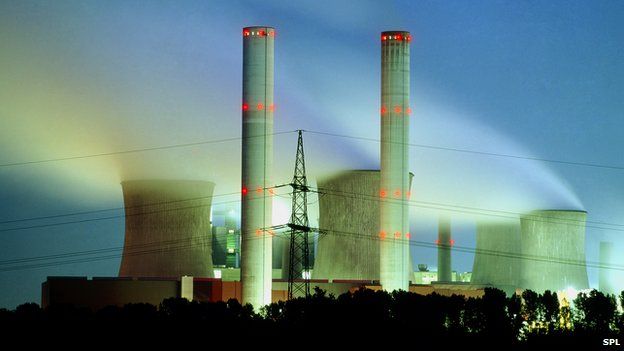EU parliament rejects plan to boost carbon trading
- Published

The European Parliament has rejected a plan to rescue the EU's ailing carbon trading scheme.
Members narrowly voted against a so-called "backloading" proposal that would have cut the huge surplus of allowances currently being traded.
Because of this excess, the price of carbon on the EU Emissions Trading Scheme (ETS) has plunged to less than 5 euros a tonne.
But opponents won the day by arguing the plan would push up energy costs.
The price of carbon has fluctuated considerably since the ETS was launched in 2005. The scheme limits the emissions from around 12,000 power plants and factories across the 27-member bloc.
At one point the trading price was well above 30 euros per tonne But concerns over the growing number of allowances issued has caused a significant drop in recent years. In January this year it hovered around 3 euros per tonne.
In an effort to push up the price and make low carbon investments more attractive the European Commission proposed withholding around 900 million allowances from the market over the next two years. The hope was that this "backloading" proposal would promote scarcity and would drive up the price.
The move was backed by a number of European energy companies which placed a full page advertisement in the Financial Times urging a "yes" vote in the Parliament.
But industries that use a large amount of energy were angered by the proposal. They said that the low price of carbon accurately reflected the economic reality of a Europe struggling with a slump for the past four years.
They said that backloading would put many companies at a significant competitive disadvantage to businesses in the US which have benefitted from lower energy costs thanks to shale gas.
Despite political backing from the UK, France and Italy, MEPs voted against the proposal by 334 votes to 315 with more than 60 abstentions. It will now go back to the Parliament's environment committee for further consideration.
Poland's minster for the environment, Marcin Korolec, welcomed the move in a tweet.
"The vote of reason," he wrote.
"Hope we can focus now on discussions on 2030 vision. Things that matter."
However there was anger about the actions of UK Conservative MEPs. Twenty two Tory members voted against the backloading idea.
Chris Davies is the Lib Dem spokesman on environment in the European Parliament. He said the actions of the Conservatives undermined the efforts of the coalition government to protect the environment.
"Conservative MEPs could have made a decisive difference and levelled the playing field for UK manufacturers building car parts, aerospace technologies and other energy intensive export businesses.
"Instead they have let their hatred of the EU get in the way of their own party policy and of economic growth.
The EU Commissioner for climate action, Connie Hedegaard said the she regretted that backloading had been rejected.
''Europe needs a robust carbon market to meet our climate targets and spur innovation," she said in a statement.
"The Commission remains convinced that backloading would help restore confidence in the EU ETS in the short term until we decide on more structural measures. We will now reflect on the next steps to ensure that Europe has strong EU ETS."
Some environmental groups were furious that the plan had been rejected. According to Joss Garman, political director of Greenpeace UK, it cast doubt on the future of the scheme.
"The central plank of Europe's strategy for cutting carbon emissions is now rendered impotent as it won't stop a single dirty coal plant from being built," he said.
Follow Matt on Twitter.
- Published8 March 2013
- Published21 January 2013
- Published5 April 2012